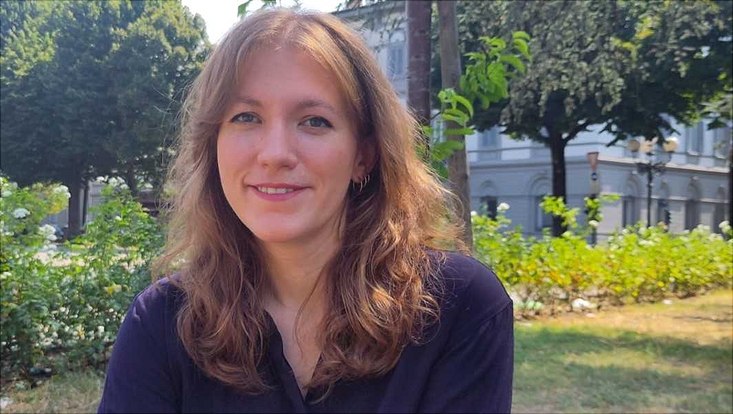Carolin Slickers, M.A.

Curriculum
Carolin Slickers is currently a PhD candidate and scholarship holder at the German-Italian Graduate School (University of Bonn, Università degli Studi di Firenze). She studied Comparative Literature at the University of Bonn, the Sorbonne Paris IV and the University of St Andrews. Her thesis, entitled Infinite Infrastructures: Oil’s Spatial Relationships in 20th century (European) Fiction investigates the literary spatial imaginaries in European Petrofiction. Her research is focused on Energy and Infrastructural Humanities, Gender Studies, and feminist literary history. She is spart of the DFG-funded research network „Literature and Energy“.
Publications (selection)
- Reading Energy: Literatur(-Wissenschaft) im Feld der ›Energy Humanities‹, in: Literatur und Zukunft. Beiträge zum Studierendenkongress Komparatistik 2022, ed. by Lara Ehlis, Berlin: Christian A. Bachmann, 2024, pp. 113–128.
Research project: Infinite Infrastructures: Oil's Spatial Relationships in 20th Century Literary Fiction
The research project investigates petroleum infrastructures in 20th century petrofiction and draws on the findings of the spatial turn and the research areas of petrocultures and infrastructural humanities. It assumes and discusses a potential (temporal and spatial) endlessness inscribed in the petroleum complex: as infinite infrastructures, literary petroleum complexes transgress geographical and geological boundaries. The study’s body of text is composed of narrative fiction from Austria (Othmar Franz Lang’s Männer und Erdöl), Italy (Pier Paolo Pasolini’s Petrolio, Italo Calvino’s La pompa di benzina), the GDR (Kurt Barthel’s Terra Incognita), Scotland/UK (George Brown MacKay’s Greenvoe, Al Alvarez’ Offshore) und the french-speaking world (Sandrine Bessora’s Petroleum, Jean Rolin’s Ormuz).
Petrofiction and the entire context of energy literature call our readings and instruments into question, as well as our understanding of what literature is and what it does. In line with the semester's thematic focus on ‘resistance,’ the project traces various constellations of representative, aesthetic, and epistemological resistance of petroleum.
Research results: Infinite Infrastructures: Oil's Spatial Relationships in 20th Century Literary Fiction
My project focuses on the discrepancy between the economic and social impact of petroleum in our present day and its apparent absence as an aesthetic or discursive form in the arts, cultural production and the humanities. The focus here is on 20th-century narrative literature in English, French, German and Italian. This assumption of cultural absence coupled with evident social influence has been discussed extensively in the field of petrocultures research, but rarely with regard to epistemologies of force.
The research project has drawn on these considerations of the concept of force to show that ideas of force-related dynamics, such as Aristotle’s consideration of withdrawnness as privatio, offer new perspectives for discussing petroleum in literature and the arts not only as a figuration of an energy system, but as a literal matter of force. Based on this, literary techniques of withdrawal can be developed, whether on a media, aesthetic, or narrative level, which appear as a common denominator in the comparison of the selected narrative texts. In textual withdrawal, force implementations themselves are negotiated when, for example, in the sense of offshoring, both petroleum and the possibilities of knowledge about it are always outsourced to places and spheres that appear to be inaccessible to the texts, thus turning texts into machines of potentiality.
The integration of force as a literary dynamic can form a productive addition to previous research approaches in the Energy Humanities, or in this case, particularly in petrocultures research: thus, the original promise of this research field to expand our readings and discuss what literature is and what it can achieve (in purely power-theoretical terms) might be supported.
